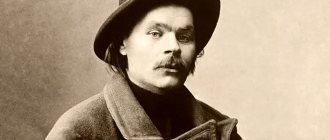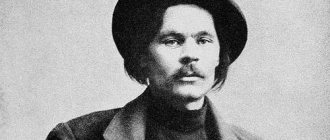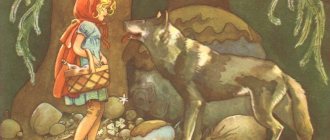- Essays
- On literature
- Bitter
- Based on the story of Old Woman Izergil
A brilliant work called “Old Woman Izergil” was written by Russian and Soviet writer Maxim Gorky. There is quite a bit of meaning in it.
But what is the main idea and idea of the work? Maxim Gorky fit the narrative into two stories that make up the work. The first is the story about Larra, the second is about Danko. Each of them participates in the disclosure of the author's thoughts.
The old woman lies on the hot sand and warms her tired bones. Here she begins to tell the author stories from her youth, who, in turn, conveys them to the reader.
The story about Larra begins with the fact that there was a proud eagle and he flew into the village. He chose the most beautiful girl and made her his wife. Soon she gave birth to a son and after a while returned to the village with an adult guy. He was a proud young man, with a beautiful body and eyes. He had no respect for older people, and in general he took whatever he wanted, even if it was wrong. One day he killed a girl who pushed him away. Such an act deserves severe punishment, and he received it. Because of his pride, Larra was doomed to immortal loneliness. What does this story teach? Don’t be proud, respect your elders, otherwise you can be doomed to terrible punishment.
The story about Danko is different. The negative characters in it are stupid and ungrateful people. People lived on the lands, but another tribe came, stronger than them. It drove them away. They went into the forest with poisonous gases and died gradually. Many began to think that it was better for them to return and submit. Then a beautiful, brave young man, Danko, emerged from the crowd. He volunteered to lead people to new lands. They walked through dense forests and many died. Soon they began to blame the young man that all this was happening because of him. They wanted to group and take Danko’s life. Then the young man looked at them, and he felt so sorry for these unfortunate creatures that something ignited inside him. It was the heart. Danko tore out his fiery heart out of a desire to help these unreasonable creatures. Died. But the world was illuminated by this beautiful flame. This is what the story about Danko is about.
The great writer Maxim Gorky gives the most vivid verbal description of two types of people, their actions and consequences. It is necessary to draw certain conclusions after reading the work. Especially after reading the books of the great creator of words, Maxim Gorky.
Essay 3
The story “Old Woman Izergil” consists of three different stories - two legends and one story.
In the legend of Larry, the author introduces us to an atypical character, a young man whose father is an eagle. Through his image, the author condemns such vices as narcissism and selfishness. Larra considered himself so special that without hesitation he took the girl’s life, only because her refusal offended him, because she refused to fulfill his whim.
The tribesmen were so outraged by what happened that they decided to immediately punish the narcissistic young man. His punishment was loneliness and freedom. Having heard his sentence and not seeing any punishment in it, he just laughed. Later he realized what a terrible punishment it was to live alone for thousands of years and seek death in vain. Thus, Gorky leads readers to the idea that when you are alone, freedom costs nothing, life turns into hard labor.
The character of the next legend is the antipode of Larra. He is ready to sacrifice himself for the sake of others. Danko lived in the wilderness among a tribe. He was handsome and brave. One day he promised his fellow tribesmen that he would lead them from swampy swamps and dark forests to the light. The path was long, people began to doubt that they would be able to get out and began to scold Danko for such an irresponsible decision. And then, to illuminate the path, Danko tore out his heart, burning like the sun. Despite the fact that at the cost of his life he brought his fellow tribesmen out of the swamps, they were never able to appreciate his action. One of them “carelessly” even stepped on the smoldering embers of his selfless heart, so that nothing at all would remind him of Danko’s feat. They forgot about him very quickly, because if people continued to remember Danko, they would have to remember their own cowardice.
In between the legends, the author tells the story of the old woman Izergil, who spent her entire life captive to passions. Many men loved her, and many even died for her. But it is unclear whether Izergil herself truly loved any of them. Like Larra, she believed that everyone should indulge her and used people solely in her own interests. She didn't think about anyone but herself, she didn't care about the feelings of others. But one day it was her turn to pay for her actions. She fell in love, but the feeling was not mutual. She found herself in the shoes of those she used. She realized that there should always be a place for heroic deeds in life and that life can only be complete if a person lives not to satisfy his own needs, but for the sake of loved ones.
The main characters of the story Old Woman Izergil
A wonderful story written by the famous Russian writer Maxim Gorky is called “The Old Woman Izergil”. The main characters of this Gorky creation are unique people, pure, bright, selfless and ready to do anything for the sake of their cherished dream.
The narration is told in the first person. The author, who once, sitting by the shore, talked with the old woman Izergil, who lived a long life full of acquaintances and meetings. She, warming her old rattling bones in the sun, had something to tell the author about. And he listened and brought these wonderful stories to the readers.
Old Isergil
As for the old woman Izergil, she was a beautiful girl in her youth and youth. She was slim. But now it is absolutely impossible to see the former attractiveness in this little body. Izergil’s teeth fell out, her eyes faded, and the skin of her face, and her whole body, was covered with wrinkles. Describing the old woman Izergil, Maxim Gorky wants to convey the idea that time will not spare anyone: neither the beautiful nor the ugly. Sooner or later, each of us will grow old and in this shell it will be impossible to see the appearance we once had.
Despite the fact that the old woman was beautiful, which she has not been able to maintain to this day, she had incredible intelligence, cunning, and sociability. These qualities helped her to exist during her life, enjoying every moment spent on earth. It seems to me that a person with vast life experience like Izergil could easily understand and highlight for himself the meaning of existence on Earth.
The old woman told the author two stories, each of which has a romantic hero.
Larra
The hero of one of the stories is Larra. His mother is a simple woman and an eagle. Larra is handsome, strong, like no other person is strong. His eyes are cold, like a feathered one. The hero is free, arrogant, does not understand the value of life, and has no respect for older people.
Larra fell in love, but his chosen one rejected him and therefore, without hesitation, he killed the girl. For which, as punishment, the elders granted him loneliness and freedom. The hero turns into a shadow that walks around a lot in search of its death, but it never manages to die.
Danko
The hero of another story is a young man named Danko. He was brave, handsome, and gave freedom to the people, putting his life and heart on the altar. He was chosen as a commander so that people could get out of places from which it is impossible to get out.
Danko lived for others and this is precisely his meaning of being. When the tribe stops trusting him, the hero is forced to rip open his chest and pull out his heart. Danko dies, but he glows blue, which cannot be said about Larra - a shadow.
The secondary characters include a fisherman from Prut, a Hutsul and a representative of the Turkish people. The fisherman was the one whom young Izergil liked, but then she stopped loving him, and he was executed for a crime committed in tandem with an acquaintance.
Minor characters of the work
The secondary characters of this work are a fisherman from the Prut, a Hutsul, a rich Turk, the son of a Turk, Arcadek.
- The fisherman from the Prut is a tanned, attractive, timid young man with whom Izergil fell in love when she was about fifteen. Her mother found out about everything and beat her, but this did not become an obstacle for the girl. Every day she ran to him, but soon she became uninterested in him. Soon he was executed along with the guntsul.
- Hutsul is a young, red-haired guy with curls and a mustache. Very gentle and sad, looking at death with dignity.
- The Turk is an old and very wealthy man who took Izergil into his large harem, where the girl lived for about a week.
- Izergil arranged an escape from the palace with his son. A young and attractive young man who went to the next world in the arms of his love, unable to bear the enormous homesickness.
- Arcadek is another lover of young Izergil.
Option 4
Maxim Gorky is a Russian and Soviet classic whose works are still studied, read and quoted. What is the reason? It's pretty obvious. Exciting stories, interesting images, individual writing style. In addition, the author touched on some epic elements in his works, in particular, in the story “Old Woman Izergil”.
The structural unit consists of two parts: about Larra and about Danko. An old woman begins an instructive story.
The part about Larra begins with the following events. A huge eagle flies into the village for a very trivial purpose. Kidnap one of the local girls and make her your wife. The fruit of their relationship was a handsome young man, with whom the “bird’s wife” returned to her abode. He looked like Apollo, but along with his beauty he had a lot of pride. Once he killed a girl who rejected him. The punishment was severe: Larra was excommunicated from civilization and doomed to eternal solitary wandering.
The next part is dedicated to a certain Danko. In Danko's world, people are ignorant and ungrateful. A hostile tribe drove him from the occupied territories. And then the hero appears. Danko. He proposes to move to uncharted lands so that the tribe can continue to exist. The path was not easy. Many died on the road. Murmurs against the young man grew. The idea arose to kill the young guide and return to the old occupied territories. Danko was truly infuriated by the passivity of the surrounding society and decided to take drastic measures; tear out your heart and illuminate the road for those walking with fiery light.
The part about Larra teaches that one should never turn away from society, one must serve it faithfully, rejecting personal motives dictated by pride and selfishness. Otherwise, the individual is doomed to eternal loneliness.
The second part is about sacrifice. It dictates that for the common good one must be able to sacrifice oneself. The personal is not as important as the public. Only through common sacrificial efforts can great results be achieved. Here it is worth remembering both the heroes of war and the heroes of labor who sacrificed their personal time, health, and sometimes their lives for the sake of a common victory.
Essay based on the work of the Old Woman Izergil
Quite a few stars shine in the sky of Russian literature, and one of them is the famous brilliant writer named Maxim Gorky (Alyosha Peshkov). During his rather long life, the author experienced many historical events and wrote a large number of works that are revered and enjoy unfeigned respect even among modern critics.
One of Gorky’s famous works, which is studied in middle school, is a work called “The Old Woman Izergil.” An essay-reasoning on this creation is presented in this text.
What kind of work is this? Why is it called that? What thoughts did Maxim Gorky want to convey to his faithful readers?
The narrative begins with the author lying on the seashore, taking a break from hard work. At this moment he meets a woman named Izergil. She is very old, which is why he has the right to call her an old woman. Due to her age, the old woman has a lot of life experience and knows a lot of interesting and instructive stories.
She shares two of them with the author, each of which can be quite useful and interesting to his readers. Each of them carries a deep meaning and teaches something or encourages reflection.
The hero of one of the stories is the son of a bird and a human woman, who grew up to be a smug, pompous creature, not accustomed to rejection. Because of this he suffered. He kills the girl who did not return the young man's love. Local elders decide not to kill or stone the criminal, dooming him to immortal loneliness. It seems to me that this is really a harsher punishment than deprivation of life. And the hero understands this. The instructiveness of this story lies in the fact that pride, complacency and disrespect for elders can be fairly punished. Issues of healthy pride, honor and arrogance are also raised.
The second story tells of a young man with a burning heart who tore it out of himself in order to light the way for other people. It is a pity that, due to their stupidity, they could not appreciate and understand it. The young man's name was Danko. This story teaches that sometimes you have to sacrifice yourself, your life for the good of the whole society.
Kindness and cruelty in the story “Old Woman Izergil”
Kindness is one of the main spiritual qualities of a person, manifested in his actions and attitude towards others. A kind person always strives to take care of others, he is ready to selflessly fight for their happiness even at the cost of his own life, no matter what.
Cruelty, in turn, is a sharply negative character trait that society tries to reject and eradicate.
A cruel person is like an animal for which there are no norms and rules, but only their own needs and needs. This quality serves only its owner, and it brings only misfortune and troubles to those around him. To prove my point, let’s turn to Maxim Gorky’s story “Old Woman Izergil.”
In the work of the great writer, the main character tells us about the legend of Danko. The young man sacrificed his life to save the tribe.
Danko realized that the people closest to him were doomed to death, that without him there would be no one to lead them to a place where they could live in safety. Therefore, he tore out the burning heart from his chest and illuminated the path for people with it.
I believe this example is a clear example of how kindness works in life. She is capable of saving lives, as Danko did. For a kind person, there are no self-interests; he is always ready to selflessly help in difficult times - this is exactly what the author wanted to show us.
Also in the story, the author gives us another legend - about Larra. The main character, a young and powerful son of a man and an eagle, liked a girl from a tribe of people, but she refused him. For this, Larra killed her by hitting her and putting his foot on her chest.
Larra, due to his excessive pride, showed cruelty towards another person, believing that he should do whatever he was told. The author wanted to convey to us the idea that cruelty is the worst manifestation of human nature.
Cruelty is always associated with personal desires, it is extremely selfish, driven by anger and hatred. So, having considered both arguments, we are convinced that kindness and cruelty are opposite concepts in their meaning.
Cruelty has no place in our world, its nature is wild and kills the person himself. This quality makes a person unhappy, destroys him from the inside, does not allow him to love himself and others, and fully enjoy life. In conclusion, I would like to express the hope that there will be more kind people in the world, always ready to help and lend a shoulder to those around them.




